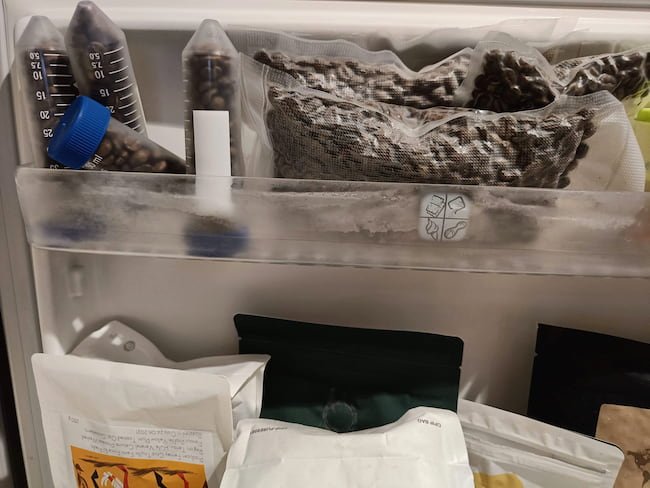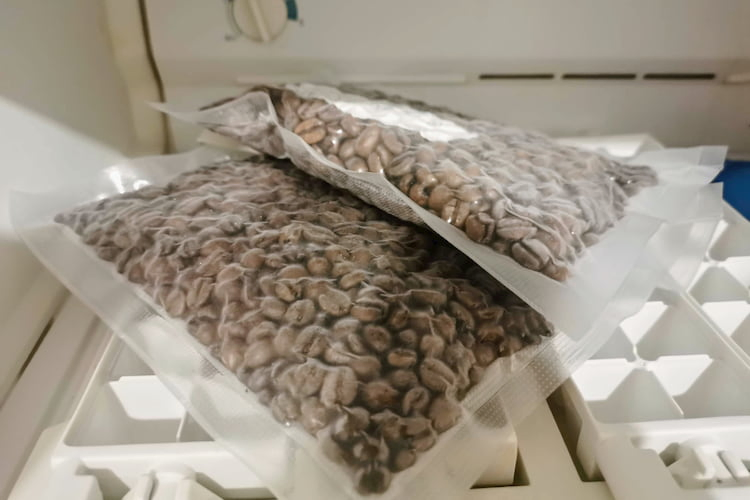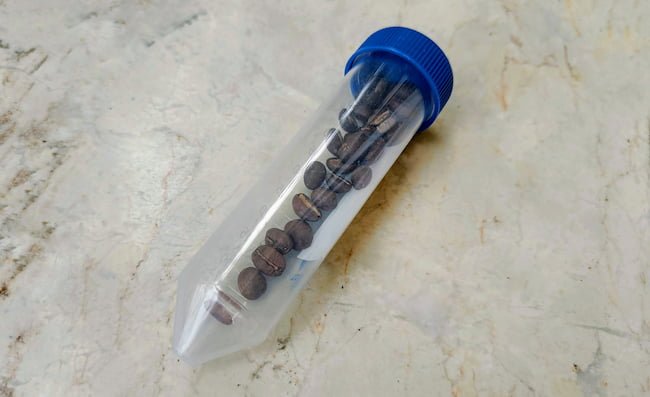Freezing coffee beans used to have a bad rep. But now, many coffee geeks see it as a game-changer when it comes to enjoying fresh, flavorful coffee at home.
You can extend the shelf life and keep the coffee tasting fresh for months.
What’s not to like?
This article will look at the science and the practical ways you can freeze coffee beans.
We’ll discuss the benefits of freezing coffee and the more profound implications for you and the coffee industry.
Freezing is not a sin 🥶
There has been some debate on whether or not freezing coffee (or, more generally, storing it in the fridge) is a good idea.
The old conventional wisdom was that storing cold would damage coffee and affect its flavor.
Condensation was one of the main concerns for freezing coffee beans.
It was thought that the water droplets that form on the surface of the beans when they are moved from cold storage to a room-temperature environment could damage them and affect their flavor.
While this is still somewhat a concern, there are ways around it. But more about that later.
Another concern is that since the fridge and freezer are full of pickles, old Sriracha sauce, and hundreds of other things, some smell could be transferred to the coffee.
Again, if you package coffee correctly, this shouldn’t be a concern.
💡 Sidenote: Freezing is technically a bad term for what we’re talking about here. Freezing implies that water goes from a liquid state to a solid one, and since there’s almost no water in roasted coffee, it would be more correct to say that you’re storing it “ice cold”.

The benefits of freezing coffee
There has always been a massive emphasis on freshness in the specialty coffee movement (which started just around two decades ago).
After 6-8 weeks, premium coffee generally doesn’t taste that premium anymore.
But this also makes life rather difficult for roasters, coffee shops, and consumers.
If coffee must be roasted within the last 2-4 weeks that will present some logistical challenges.
Enter freezing.
Freezing is a bit like magic. And coffee is not different from other food types in this regard.
Freezing slows down the biological clock that will otherwise keep ticking. This is called the “Arrhenius equation” in science lingo.
Theoretical chemist and coffee scientist Christopher Hendon gave a presentation in 2017 about the subject. In the talk, he states that every time you lower the temperature by 10 degrees celsius, you slow down things to about half the speed.
“If you cool it down from 20°C down to -20°C, which is a conventional freezer, everything’s going on at 16 times slower,” the scientist explained.
Let’s do the math real quick: This takes your ideal two-week window and turns it into a 32-week window. That’s more than half a year.
It means you can buy coffee beans in larger quantities, freeze them, and then enjoy fresh, flavorful coffee for months or even years instead of just weeks or days.
On the other hand, it also means that you should store your coffee differently depending on where you are in the world.
If you live in a cold region (such as Scandinavia), you might be able to store the beans for double as long if you compare to a tropical country.
This is often overlooked. Usually, the discussion around storing coffee is much more black and white. However, it’s not uncommon that there can be a 10-degree celsius difference between countries.
Or, if you’re a coffee shop, it could also enable you to have a collection of coffee beans that are stored over long periods – almost like a wine cellar.
Instead of being tied in to only drinking coffee from a specific country or variety at a time, you can have dozens of options at hand.
Of course, we all know that grind distribution can significantly impact coffee flavors, so this is a nice bonus.
How to freeze beans
Okay, but how do you do it, practically speaking?
Generally, you shouldn’t freeze coffee right after roasting; instead, let the coffee degas a bit.
Most people recommend freezing the coffee when it is peaking flavor-wise. So for specific light roasts, it would make sense to freeze it 7-14 days after roasting.
There are three main ways to freeze coffee beans:
- Vacuum sealing
- Storing them in a small lab sample container meant for single dosing
- Freezing whole bags
Vacuum sealing
Vacuum sealing has been considered the gold standard for freezing coffee beans. By using a vacuum sealer, you can remove all of the air from the bag, which will prevent the formation of ice crystals and prevent oxidation.
Vacuum sealing is also pretty flexible. Depending on the size of the bag, you can freeze everything from a single 12-gram dose up to a pound.
If you’re making smaller samples, they are suitable for single dosing. Bigger batches can be thawed a bit in advance.
The main downside is that you need to buy a vacuum sealer and bags. Also, it’s a bit time-consuming, and sealing bags can sometimes feel cumbersome.

Lab sample method
For that reason, many hardcore coffee freezers also swear by the lab sample method. The good thing about this is that you can buy a set of these tiny bottles and start freezing. In addition, these small bottles are easy to reuse and have a capacity of around 20-22 grams, making them pretty ideal for your daily pour-over batch.
I will take it directly from the freezer and grind and brew it if I freeze coffee using this method. Since you’re using the beans right away, it doesn’t matter that they are exposed to higher temperatures.
Freeze in the original bag
Another classic way to freeze coffee is to use the bag it comes in. This makes a lot of sense since these bags are often sealed and gas flushed. They are already offering the beans a protected environment, and by placing them in the freezer, you’ll slow down the aging even further.
I typically freeze coffee like that if I have ordered 5-6 bags from a roaster online. Often you’ll get free shipping by ordering a certain number of bags. But I don’t want the coffee to get stale while I go through the bags. So in that scenario, it makes sense to store, let’s say, four bags in the freezer. I will then take them out, one by one, a couple of hours before I intend to use them. This gives them time to get to room temperature, so you don’t have problems with water crystals forming on the beans.
Some roasters use bags with a valve to allow degassing. Squeeze out excess air and close this valve with a piece of tape before freezing.
⚠️ Disclaimer: As I explain in the YouTube video above, I have begun to use coffee from the freezer more in a more “relaxed” manner. I have found that condensation is not much of a concern if you just scoop out your dose of beans quickly while the bag is still in the freezer. This type of freezing might not be “perfect” and scientifically correct, but it’s worth trying!
My experience with freezing
Being a coffee geek who always has several bags of beans at home, I have tried all three methods. For my part, I think that freezing coffee in the original bag is the simplest and most practical way to cash in on the trend. It doesn’t require any special equipment; it’s easy and fast.
However, if you have rare beans on hand or are into single-dosing, then the other methods should also be on your radar.
I have been freezing coffee regularly for over a year, and in general, I have been exceptionally pleased with the experience.
Therefore, I think it’s fair to assume that if the coffee is excellent and stored under the right conditions, it will taste great from the freezer.
To confirm my impression, I have undertaken a few cuppings side-by-side of frozen vs. unfrozen. The results are pretty stark. For example, after six months, a coffee stored airtight at room temperature would taste stale and flat with a muted aroma. On the other hand, the frozen specimens reacted much more like fresh coffee, even forming a bubbly crust in the cupping bowl.
Dispelling more coffee myths
Besides temperature, coffee also has a few other “traditional” enemies. Let’s talk a bit about them and my practical experience.
- Oxygen: Exposing coffee beans to circulating air is a surefire way to make them taste stale and rancid sooner than necessary. Almost all coffee roasters take this into account and pack their coffee in bags that minimize the effect of oxidation.
In theory, vacuum packing beans should increase shelf life, but I have found that storing the coffee in a sealed container with minimal headspace does almost the same job.
Even more extreme is that I have occasionally brewed half a sample and let the remaining part stay in the same container. In theory, you have a lot of additional air in the container. But in practice, the coffee would taste just fine a few days or even weeks later. I wonder if the harmful effects of oxygen are also decreased at lower temperatures? It seems like it.
- Condensation: And what about the often quoted threat of condensation?
Again, it’s not something I have noticed to have a huge effect when you carefully take coffee from the freezer and quickly reseal the container. Maybe a tiny bit of ice crystals are forming on the beans?
But since the coffee is put back in the freezer right away, this phenomenon is not as big a deal as previously thought. I’m sure it would be something else if the coffee were preground, but less surface area is exposed in its whole bean form. It also seems reasonable to conclude that coffee is less hydrophilic in this state.
I know it might sound a bit controversial, but after being very careful around my frozen coffee, I have started treating it more like a bottle of milk or other food items in the fridge.
Take it out when you need it, get what you need, lid back on (or close the bag with the seal), and put it back in.
I treat it more like food than something in a high-security bio-lab and that is working well for my way of consuming coffee.
Other implications
I predict that freezing will be a big trend in coffee in years to come, and it might even become mainstream.
Think about all the stale coffee sitting on the shelves in the supermarkets? Wouldn’t it make sense to store it in the frozen food department next to the peas and carrots? That should benefit both shops and consumers.
Another area still in the developing phase is the freezing of green coffee beans. Imagine being able to store and roast small quantities of certain auction lots year after year?
This could elevate coffee and create a market more similar to wine and fine spirits.
Further Reading: How Long is Brewed Coffee Good For?
FAQ
Yes, freezing coffee beans can extend the shelf life with months and even years. Read this article, if you want to learn how to do it the right way.
Yes, you can freeze whole coffee beans. However, it’s important to do it the right way, which means storing and sealing in an airtight container. In this article, we offer some practical ways to go about it.
No, you don’t have to freeze coffee before grinding it. However, if you do choose to grind frozen coffee, it will give you a better particle consistency, according to a scientific experiment made recently. Also, it’s practical to grind frozen, if you’re already using the freezer to store your beans.
